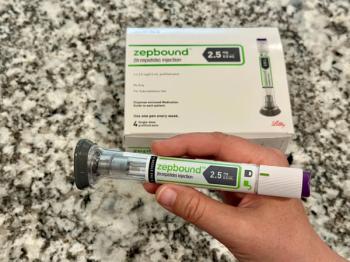
Weight Management
Latest News
Latest Videos

CME Content
More News

Real-world studies reveal GLP-1 medications like semaglutide and tirzepatide yield less weight loss than clinical trials, highlighting treatment discontinuation challenges.

GLP-1 medications like semaglutide face scrutiny over compounded versions, raising concerns about patient safety and counterfeit products in diabetes treatment.

A low-fat vegan diet reduces dietary acid load and promotes weight loss more effectively than a Mediterranean diet.

Low-energy total diet replacement programs show promise for individuals with obesity and type 2 diabetes, without increasing eating disorder risks.

Eli Lilly is expanding access to tirzepatide, a groundbreaking GLP-1 medication for weight management, offering more affordable options for obesity treatment.

Combining GLP-1 therapy with specific antibodies can reduce muscle loss during weight management, enhancing overall health outcomes.

By translating clinical evidence and real-world data into meaningful care, pharmacists uniquely position themselves to guide patients on GLP-1 therapies in obesity.

Although women might benefit from fattier breakfasts, men could respond best to carbohydrates.

Electronic prior authorization (EPA) technology can streamline the complex process of obtaining prior authorizations for GLP-1 medications.

Incretin-based therapies, including GLP-1 and dual GLP-1/GIP receptor agonists, are transforming the management of type 2 diabetes, obesity, and cardiovascular risk.

Katherine H. Saunders, MD, DABOM, explores the role of pharmacists in supporting long-term weight management with GLP-1 therapies, including strategies for counseling on lifestyle interventions, managing adverse effects, and ensuring patients receive individualized, evidence-based care.

The expert explored the complex prior authorization process for GLP-1 medications, discussing challenges in documentation and medical necessity.

Orforglipron showed promising results in managing type 2 diabetes, offering a potential oral alternative to injectable treatments.


The announcement came shortly before updated results from the SURMOUNT-5 clinical trial, which found Zepbound had superior weight-loss effects over Wegovy.

Tirzepatide outperforms semaglutide in weight loss, achieving an average reduction of 20.2% in a pivotal trial for obesity management.

Pharmacists are positioned to significantly impact weight management by offering accessible expertise in medication, lifestyle guidance, and long-term support for healthier choices.


Adherence to GLP-1 receptor agonists showed a 59% drop in inpatient hospital costs.


A holistic approach emphasizing lifestyle modifications is essential to maintain weight loss after and while stopping medication.

The findings suggest a potentially elevated risk of vision impairment with semaglutide (Ozempic, Wegovy; Novo Nordisk) use compared with other weight loss and diabetes medications.

Automated diagnosis verification offers a promising alternative for managing the use of GLP-1 medications.

Pharmacists play a crucial role in educating patients on proper administration and adherence to GLP-1 treatments.

The expanded discount program offers semaglutide for $499 per month for all eligible cash-paying customers.




































